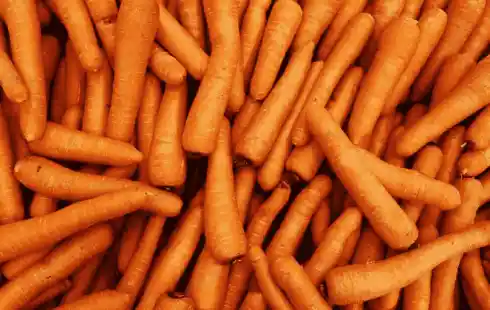
Ukrainian Diplomat Calls for Stronger Security Commitments Beyond NATO-Style Guarantees
Section: Politics
 Baby carrots are a staple in many households, favored for their convenience, sweetness, and crunchy texture. These small, perfectly shaped orange snacks are a common sight in lunchboxes, party platters, and grocery store shelves. But what exactly are baby carrots, and where do they come from? Are they a natural marvel, or is there more to their story?
Baby carrots are a staple in many households, favored for their convenience, sweetness, and crunchy texture. These small, perfectly shaped orange snacks are a common sight in lunchboxes, party platters, and grocery store shelves. But what exactly are baby carrots, and where do they come from? Are they a natural marvel, or is there more to their story?
Contrary to popular belief, baby carrots are not a unique variety of carrot. Instead, they are typically made from full-sized, mature carrots that have been peeled and cut into smaller pieces. There are two main types of baby carrots: true baby carrots and manufactured baby carrots. True baby carrots are young carrots harvested before they reach full maturity. They are typically more tender and sweeter than their fully-grown counterparts and are often sold with their green tops still attached. You'll usually find these at farmers' markets or specialty stores.
Manufactured baby carrots, on the other hand, are the ones most commonly found in supermarkets. These are made from larger carrots that are too misshapen or imperfect to be sold whole. Instead of wasting these carrots, they are cut into 2-inch pieces and then machine-shaped into the familiar baby carrot size. After this, they are peeled and polished to create that smooth, uniform appearance we all recognize and love.
The concept of manufactured baby carrots can be traced back to the early 1980s. A California carrot farmer named Mike Yurosek faced a significant problem: a large percentage of his carrot crop was being discarded due to cosmetic imperfections. In an innovative move, Yurosek began cutting these imperfect carrots into smaller pieces and shaping them into uniform, bite-sized snacks. This not only reduced waste but also created a new, convenient product that quickly gained popularity.
Nutritionally, baby carrots are a powerhouse. Just like regular carrots, they are packed with nutrients, being an excellent source of beta-carotene, which the body converts into vitamin A. This vitamin is essential for good vision, immune function, and skin health. Additionally, baby carrots provide fiber, vitamin K, potassium, and antioxidants, making them a low-calorie, healthy snack option for both adults and children.
While baby carrots are a healthy snack, some concerns have been raised about the chlorine rinse used in their processing. This rinse is used to prevent bacterial contamination and ensure the carrots are safe to eat. The chlorine levels used are within the limits set by the U.S. Food and Drug Administration and are considered safe for consumption. However, for those who prefer to avoid this, rinsing the carrots under water before eating can reduce any residual chlorine.
The production of manufactured baby carrots helps reduce food waste by utilizing carrots that might otherwise be discarded due to their size or shape. However, the process does require additional resources, such as water and energy for peeling and shaping the carrots. Additionally, the plastic packaging commonly used for baby carrots contributes to environmental pollution. Consumers can mitigate this impact by choosing baby carrots packaged in recyclable materials or buying true baby carrots from local farmers' markets.
Baby carrots, whether true or manufactured, are a convenient and nutritious snack. They offer the same health benefits as regular carrots and have helped reduce food waste in the agricultural industry. However, it's essential to be mindful of their environmental impact and make informed choices about the types of baby carrots we purchase. Whether enjoyed as a snack, added to salads, or included in a cooked dish, baby carrots provide a delightful crunch and a burst of nutrition in every bite.

Section: Politics

Section: News

Section: News

Section: News

Section: Arts

Section: News

Section: News

Section: News

Section: News

Section: News

Health Insurance in Germany is compulsory and sometimes complicated, not to mention expensive. As an expat, you are required to navigate this landscape within weeks of arriving, so check our FAQ on PKV. For our guide on resources and access to agents who can give you a competitive quote, try our PKV Cost comparison tool.

Germany is famous for its medical expertise and extensive number of hospitals and clinics. See this comprehensive directory of hospitals and clinics across the country, complete with links to their websites, addresses, contact info, and specializations/services.

Join us at the Kunstraum in der Au for the exhibition titled ,,Ereignis: Erzählung" by Christoph Scheuerecker, focusing on the captivating world of bees. This exhibition invites visitors to explore the intricate relationship between bees and their environment through various artistic expressions,...
No comments yet. Be the first to comment!